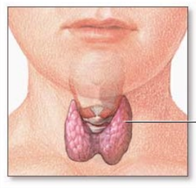The thyroid is a small but powerful gland that is located in the front of our lower neck. Similar to a thermostat, it regulates our overall metabolism. Your metabolism is the sum total of all the chemical  reactions going on in your body to create and use energy. The hormones produced by the thyroid helps regulate digestion, energy use, growth and development, brain function, body temperature, muscle control, and more. Low thyroid function, also called hypothyroidism, is a fairly common problem today, and often under-diagnosed. One study found it in nearly 10% of the population, with most of them being unaware of their condition (1). The incidence is more common in women than men and increases with age. The thyroid hormones are required to support life, and in severe cases, deficiency can lead to retardation and eventually death.
reactions going on in your body to create and use energy. The hormones produced by the thyroid helps regulate digestion, energy use, growth and development, brain function, body temperature, muscle control, and more. Low thyroid function, also called hypothyroidism, is a fairly common problem today, and often under-diagnosed. One study found it in nearly 10% of the population, with most of them being unaware of their condition (1). The incidence is more common in women than men and increases with age. The thyroid hormones are required to support life, and in severe cases, deficiency can lead to retardation and eventually death.
Where it starts

To understand the basics, we have to realize that the thyroid is in a feedback loop with the brain. Specifically, the hypothalamus, a tiny gland hanging down under the brain monitors the thyroid levels and energy demands of the body. As needed, it releases thyrotropin releasing factor (TRF). TRF goes to its neighbor, the pituitary gland, which makes thyroid stimulating hormone (TSH), also known as thyrotropin, to tell the thyroid to produce more hormones. The thyroid gland, in turn, produces thyroxine (T4). It is known as T4 because it has four molecules of iodine attached, shown as purple balls in the figure.
Conversion to active hormone
 T4 is not the active form of the thyroid hormone for most of the cells in the body. It has to undergo another step and be converted to triiodothyronine, or T3 for short (because one of the iodine molecules is removed). For this conversion, the correct iodine has to be cleaved off by specific enzymes called deiodinases. This active form can now perform its important functions in the cell.
T4 is not the active form of the thyroid hormone for most of the cells in the body. It has to undergo another step and be converted to triiodothyronine, or T3 for short (because one of the iodine molecules is removed). For this conversion, the correct iodine has to be cleaved off by specific enzymes called deiodinases. This active form can now perform its important functions in the cell.
Where and why is it converted?
Very little of this conversion is done in the thyroid gland, and most of it is done in the liver, gut, brain, muscles, and other tissues. These are tissues with high energy demands and they need the thyroid hormone to be activated to help produce enough energy so they convert T4 into the active T3. If the body is needing to conserve energy, it can convert T4 into reverse T3. Reverse T3 has the wrong iodine removed, rendering it inactive. Having most of the hormone in an inactive form (T4) allows the body to decide when and where it needs the energy to be turned on. This is a dynamic process that is constantly under close regulation by the brain as mentioned above.
Carried in the blood
In the bloodstream, the thyroid hormones are mostly carried around by proteins, such as thyroglobulin. The hormone attached to the protein is called bound and is inactive, the unattached hormones that float freely in the bloodstream are called free and are able to interact with the tissues. Lab values can be measured for TSH, total T4, free T4, total T3, free T3, and more. Free T3 is the most active thyroid hormone in the body. This becomes important in understanding the various lab tests and what they mean. See Understanding Thyroid Testing. [yet to be written]
Interacting with cells
The hormone then has to interact with the cells via a receptor. This is like a locked door and T3 has the right key to unlock it and get into the cell to do its work. It works to regulate the body’s metabolic rate (how fast you burn energy), the heart, digestive functions, growth and development, brain functions, muscle controls, and maintenance of bone structure.
So what does all this mean?
To sum this up, your body is constantly monitoring your energy levels, and certain glands in the brain can send out a signal to step up energy production or slow it down. This energy regulation is done largely through the thyroid hormone. These messengers from the brain can stimulate more production of the thyroid hormone we call T4. This, in turn, is converted to the active form, called T3, by many of the tissues and cells in the body. This allows local control of the energy metabolism. Sometimes the heart needs a lot of energy, such as during exercise, and much less during sleep. When the thyroid is unable to respond or is not given the proper signaling, there are many symptoms that can develop.
When it’s not working
If your thyroid is sluggish or not functioning properly, this can:
- sap your energy
- cause weight gain
- dry up your hair and skin
- cause heart irregularity
- make your hair fall out
- slow down the bowels
- make your face puffy
- decrease your ability to fight infection
- increase joint and muscle aches
- allow your hands and feet to swell
- cause carpal tunnel syndrome
- make menstrual periods irregular
- and slow down your brain function
- elevate your cholesterol
- cause a swelling of the thyroid gland called a goiter
If you have several of those symptoms, your thyroid could be the culprit.
Many things can affect it
As you can imagine, the complexity of the system means there are many factors that can influence the thyroid gland, both internal and external. It is affected by adrenal or pituitary dysfunction, dietary  deficiencies, food allergies, insulin resistance, toxins, chronic infections, stress, and more.
deficiencies, food allergies, insulin resistance, toxins, chronic infections, stress, and more.
Iodine deficiency used to be a common cause, but with routine supplementation supplied in salt, this has become fairly rare. Zinc and selenium deficiencies are more common causes of thyroid dysfunction now, in terms of mineral deficiencies.
One of the most common causes today is Hashimoto’s Thyroiditis. This is an inflammation of the thyroid gland caused by an autoimmune dysfunction where your immune system is attacking your own thyroid. This will be missed unless tested for specifically by looking for thyroid antibodies. Even though the thyroid gland is affected, the underlying problem is often related to gluten sensitivity and immune system dysfunction.
What to do
Here are a few things you can do to help your thyroid functional optimally.
- Make sure you are getting enough good quality sleep.
- Eat organic to avoid toxins.
- Control your stress levels or let some of the extras go.
- Get some regular moderate exercise.
- Consider a mineral supplement.
- Keep your blood sugars regulated.
- Most importantly, have your thyroid checked and interpreted by a knowledgeable provider.
Functional Medicine practitioners look at the root cause of disease and take thyroid problems seriously since it can cause so many problems when not functioning properly. I was told for years that my thyroid gland was fine, but when my labs were tested more completely and interpreted in a Functional Medicine light, I realized I had been mildly hypothyroid for years. Getting that corrected has helped the weight loss and more.
If you have many of the symptoms but have been told your thyroid is okay, don’t hesitate to get an opinion from a Functional Medicine practitioner.
Need Thyroid Help? Schedule a 15 min Consultation




